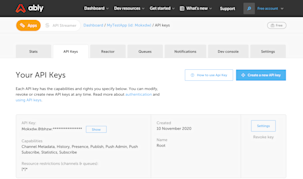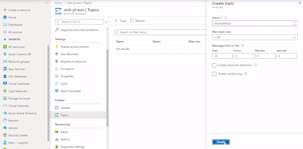Ably vs Azure Service Bus
Let us help you discover why Ably is clearly the better choice.
Easily build complete, trusted realtime functionality.
Take our APIs for a spin Ably |  Azure Service Bus | |
|---|---|---|
| Getting started and developer experience | ||
Examples A selection of examples so you can test and see the code in action. |
|
|
Documentation | Explore Ably's documentation for our pub/sub messaging platform | |
Dashboard or dev console |  |  |
SDKs Note: Only official SDKs were taken into account. | 25+ SDKs targeting every major language and development platform Including:
| 7 SDKs Including:
|
API structure | Explore Ably's API documentation for our pub/sub messaging platform | |
 Ably |  Azure Service Bus |
|---|---|
| "Hello world" code example | |
| |
 Ably |  Azure Service Bus | |
|---|---|---|
| Realtime features | ||
Pub/Sub messaging Pub/Sub is a design pattern that lets any number of publishers (producers) push messages to channels (also known as topics). Multiple subscribers (consumers) can subscribe to a channel to consume published messages. | Explore Ably's pub/sub messaging implementation | |
Message queues A message queue is a form of asynchronous service-to-service communication. Messages are stored on a queue until they are processed. Note that each message is only consumed by one subscriber (consumer). | Explore Ably's message queues implementation | |
Presence Presence enables you to track the online and offline status of devices and end-users in real time and to store their state. Essential for chat apps and multiplayer games. | Explore Ably's presence implementation | |
Message history Message history provides a means to retrieve previously published messages. For this to be possible, message data must be stored (persisted) somewhere. | Explore Ably's message history implementation | |
Connection state recovery (stream resume) In the case of unreliable network conditions, clients may suddenly disconnect.Connection state recovery ensures that when they reconnect, the data stream resumes exactly where it left off. | Explore Ably' s connection state recovery implementation | |
Guaranteed message ordering Ordering ensures that messages are delivered to consumers in the same order that producers publish them. | Explore Ably' s guaranteed message ordering implementation | Limited By default, Azure Service Bus cannot guarantee that messages are delivered in the order you want them to be processed by a subscriber at all times. You can theoretically force message ordering, but it comes at the expense of other features. |
Exactly-once semantics Exactly-once is a system-wide data integrity guarantee that ensures each message is delivered to consumers exactly-once. | Explore Ably' s idempotent publishing implementation | |
Message delta compression Message delta compression enables you to only send the changes from the previous message to subscribers each time there’s an update, instead of the entire message. Useful for use cases where there is a significant degree of similarity between successive messages. | Explore Ably' s message delta compression implementation | |
Native push notifications Native push notifications can be used to deliver messages even when clients are offline. Useful for geolocation updates or news alerts. | Explore Ably's push notifications implementation | |
Webhooks Webhooks provide a mechanism to get messages and other types of events (such as clients entering or leaving channels) pushed to your servers over HTTP. | Explore Ably's webhooks implementation | |
Serverless functions A serverless function is essentially an isolated, single-purpose piece of code that is only executed when it’ triggered by an event. For example, you can use serverless functions to send a welcome message to clients when they become present on chat channels. Note that serverless functions are usually fully managed by cloud vendors. | Ably is integrated with most serverless functions providers. We support AWS Lambda, Azure Functions, Google Cloud Functions, IFTTT, Cloudflare Workers, and Zapier. Explore Ably's serverless functions implementation | Limited Can only trigger Azure Functions. Azure Service Bus doesn’t have in-built support for other serverless platforms, such as AWS Lambda or Google Cloud Functions. |
Built-in integrations Which popular services & systems are Ably and Azure Service Bus integrated with? | Webhooks
Serverless functions
Streaming
| Webhooks
Serverless functions
Streaming
|
Known limits and constraints Find out practical limits, such as the maximum message size, or the maximum number of concurrent connections. | Channel throughput: Up to 200 messages per second per outbound connection Message size limits: 16KB for free accounts and 64KB for paid accounts. For enterprise accounts, the limit can be increased to 256KB. Maximum number of channels: Limitless - constrained only by quota Maximum number of concurrent connections: Limitless - constrained only by quota Explore the practical limits of the Ably pub/sub messaging platform | Throughput Unknown Maximum message size 256 KB for Standard tier, 1 MB for Premium tier. Maximum number of topics 10.000 for the Basic or Standard tier. The total number of topics and queues in a namespace must be less than or equal to 10.000. For the Premium tier, 1.000 per messaging unit (MU). Maximum limit is 4.000. Maximum number of concurrent connections NetMessaging: 1.000 per namespace AMQP: 5.000 per namespace |
| Supported development platforms, languages, open protocols and cloud models | ||
|---|---|---|
Development platforms & operating systems Which popular development platforms and operating systems do Ably and Azure Service Bus support via official SDKs? |
|
|
Languages Which popular programming languages do Ably and Azure Service Bus support via offical SDKs? |
|
|
Open protocols Which popular open protocols do Ably and Azure Service Bus support? |
|
|
Cloud models Which popular cloud models do Ably and Azure Service Bus support? |
|
|
| Global and reliable edge service | ||
|---|---|---|
Edge messaging network with latency-based routing Latency-based routing ensures that clients are always routed to the nearest datacenter and point of presence. | Explore Ably's routing mechanism that mitigates network and DNS issues | |
Multi-region data replication (message durability) Multi-region data replication (storage) protects against single points of failure and ensures message data durability. | Learn how Ably ensures message durability | |
Global datacenter locations How many datacenter locations do the Ably and Azure Service Bus networks consist of? Are they globally distributed? | 15 datacenters & 200+ points of presence Distributed all over the world. Explore Ably's globally distributed network of datacenters | 160+ physical datacenters in 55+ Azure regions Distributed all over the Globe. |
Uptime SLAs Here’s what the most common SLAs amount to in terms of downtime over a calendar year: 99.999% SLA = 5m 15s downtime per year 99.99% SLA = 52m 35s downtime per year 99.95% SLA = 4h 22m 58s downtime per year 99.9% SLA = 8h 45m 56s downtime per year 99% SLA = 3d 15h 39m 29s downtime per year Source: https://uptime.is/ | 99.999% Explore Ably's availability and uptime guarantees for our pub/sub messaging platform | 99.9% |
Quality of Service What QoS guarantees do Ably and Azure Service Bus provide natively? |
|
|
| Security | ||
|---|---|---|
API key authentication The simplest way to authenticate. Involves using private API keys that you can usually create and edit via a dashboard. Recommended to be used server-side, as private API keys shouldn’t be shared with untrusted parties. | Explore Ably's implementation of API key authentication | |
Token-based authentication Which popular token-based authentication mechanisms do Ably and Azure Service Bus support? Note that token-based authentication is usually the recommended strategy on the client-side as it provides more fine-grained access control and limits the risk of credentials being compromised. |
|
|
Configurable rules and permissions Which types of configurable rules and permissions do Ably and Azure Service Bus support? |
|
|
Message encryption Which types of message encryption do Ably and Azure Service Bus support? |
|
|
Formal certifications Which formal certifications are Ably and Azure Service Bus compliant with? |
|
|
| Pricing & Support | ||
|---|---|---|
Free package What do the free packages offered by Ably and Azure Service Bus consist of? | Free Developer package 6 million messages/month, 200 peak connections, 200 peak channels. Access to features such as pub/sub messaging, push notifications, webhooks, and our Firehose service. Explore Ably's free package for our pub/sub messaging platform | No free package |
Pricing model How are the Ably and Azure Service Bus pricing models calculated? | In addition to the free Developer package, we provide two paid packages: Self-service (pay for what you use every month). Includes additional features such as storage replication across multiple regions, and 99.999% uptime SLA. Enterprise. Includes all business package features + additional ones, such as 24/7 access to second-line engineers, and flexible hard limits. These packages start with 500 peak (concurrent) channels and connections, and include a message volume of 6 million messages per month. You can increase these limits with your package based on your needs. The costs are $15.00 per thousand peak channels/connections, and $2.50 per million messages. Explore Ably's pricing model for our pub/sub messaging platform | Azure Service Bus comes in Basic, Standard, and Premium tiers. Basic tier pricing is calculated based on the number of messaging operations (any API call to Azure Service Bus) and costs $0.05 per million operations. Standard tier pricing is calculated based on: - number of messaging operations (first 13 million ops/month free, a base charge of $0.0135/hour and variable price depending on the number of ops - between $0.20 and $0.80 per million ops). - number of brokered connections (AMQP connections or HTTP calls to Service Bus) - depending on the number of connections, the price can be between $0.03 and $0.025 per connection/month. - number of hybrid connections & WCF relays. For hybrid connections, the monthly price is $9.782 per listener + a data transfer overcharge of $1/GB. As for relays, pricing is based on usage ($0.10 for every 100 relay hours) and messages ($0.01 for every 10.000 messages) Premium pricing is calculated based on hourly usage at $0.928 per hour. Please note that we have used the US as a reference point, but prices may vary by region and there are further differences based on the type of support package. |
Enterprise package What benefits do the Ably and Azure Service Bus enterprise packages offer? | We offer an enterprise package with additional features and custom technical support. Key benefits
Explore Ably's enterprise package for our pub/sub messaging platform | The Premium tier is the equivalent of an enterprise package. Key benefits
|
Support What types of support options and response times do Ably and Azure Service Bus offer? | General support channels: Email, live chat, support ticket, phone, comprehensive technical documentation, Slack channels, Stack Overflow community. Enterprise support: The enterprise package includes 24/7, 365 days/year support, 24/7 access to second line engineers, and architecture reviews. Response time: 1 hour response time for enterprise customers 2 hours response time for business customers, with a target of 1 hour 24 business hours response time target for self-service customers Explore Ably's support options for our pub/sub messaging platform | General support options Email, support ticket, phone, technical documentation, community support (e.g. forums or StackOverflow). Enterprise support The Professional Direct (ProDirect) plan includes 24/7 support, a Support API (to create & manage support tickets programmatically), and operational & architectural guidance from delivery managers. Response time Within 8 business hours for Developer customers Between 1 and 8 hours initial response time (depending on severity) for Standard and ProDirect customers. |
Disclaimer: The information presented for Ably was last updated on 30 April 2025 and on 30 September 2020 for Azure Service Bus. It is possible that some details may now be out of date. If you think that’s the case, please let us know so we can update them. In any case, you should not rely solely on the information presented here and must check with each provider before deciding to integrate or buy any of these two solutions.
Compare Ably with other realtime messaging solutions
More to explore
About Ably
Ably is an enterprise-ready pub/sub messaging platform. We make it easy to efficiently design, quickly ship, and seamlessly scale critical realtime functionality delivered directly to end-users. Everyday we deliver billions of realtime messages to millions of users for thousands of companies.
Compare packages
Documentation
Rapidly build production-ready realtime capabilities with quickstart guides, realtime concepts, and full API reference.
Read the docs
Compare our tech
View more comparisons between Ably and other realtime messaging solutions and see why we are clearly the better choice.
View all comparisons



